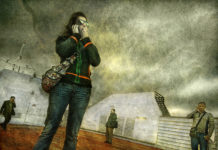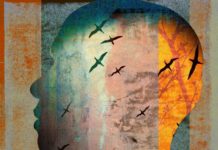Mad Flies and Bad Science
Tension mounts across the ideological divide as D-Day (DSM-5 Day) approaches. The APA has powerful allies on its side. President Obama has just launched Decade of the Brain 2 with the announcement two weeks ago that heralds the arrival of BRAIN ( Brain Research through Advances in Innovative Neurotechnologies). If that’s not enough, those who believe that science will ultimately explain madness can always rely on the media to fawn at their feet.
Does It Matter if We Believe in Mental Illness?
It's clear that different people relate to the idea of "mental illness" and labeling differently. Many people find the experience of being diagnosed with...
Anxiety Accounts for Bipolar False Positives
Researchers found that of 1,534 patients assessed at Australia's Black Dog Institute Depression clinic, a significant number received a false positive diagnosis of bipolar...
The Psychopathology of American Life
‘I’m severely depressed.’
These were the words that Donesha*, a 35 year-old African American woman repeatedly uttered to me.
Psychiatric Diagnosis Can Lead to Epistemic Injustice, Researchers Claim
A discussion of the role of epistemic injustice in the experiences of patients diagnosed with psychiatric disorders.
How Stigma and Social Factors Drive the Negative Health Outcomes Associated with Autism
A new study explores the interplay between social stress and quality of life for individuals self-identified with high-functioning autism.
Taking down the Giant: A Call for Increased Community Outreach
I think it’s helpful to see the psychiatric/pharmaceutical complex as being somewhat analogous to one of those large inflatable giants that you sometimes see hovering over car lot sales. Sure, it looks big and powerful, and it really is so long as “we the people” buy its propaganda and its drugs and continue feeding it billions of dollars and continue “bowing down” to its “almighty wisdom.” But its entire foundation consists of a model that simply doesn’t fit the research evidence at all, and quite frankly is propped up by many outright lies.
Researchers Develop New Model for Understanding Depression
Acknowledging that current depression treatments are failing many people, researchers from Michigan State and MIT have developed a new model for understanding how multiple psychological, biological, social and environmental factors contribute to depression.
Why the Fuss Over the DSM-5, When Did the DSM Start to Matter, &...
Why all the fuss over DSM-5? Why did Robert Spitzer, the editor of DSM-III, begin to protest about the “secrecy” surrounding its production as early as 2007? Why did Allen Frances, editor of DSM-IV, begin in 2009 to challenge the American Psychiatric Association’s (APA) announced goal that when making DSM-5 “everything is on the table”? Why did he dispute the APA’s position that there had been enough progress in neuroscience to call for a “paradigm shift”, and why did Frances and others go on to protest repeatedly what they viewed as DSM-5’s “medicalization of normality?”
How About a Diagnostic Alternative for Use in Talk Therapy?
Note: This post originally appeared on August 18, 2014 on dxsummit.org.
On August 5 and 6, 2014, a group of roughly twenty persons met in Washington, DC...
Susie Orbach’s Guide to Books to Understand Yourself
In this piece for The Guardian, Susie Orbach argues that we should not turn to the DSM to understand ourselves, but instead to the work of...
Does ‘Mental Illness’ Exist?
In this interview for ABC Australia, leading psychology professor Peter Kinderman discusses why we need alternative ways of understanding and supporting people in distress that take...
DSM-5 Field Trials Fail to Compare New Diagnostic Criteria with DSM-IV Criteria
Field trials for the DSM-5 fail to explicitly compare new proposed diagnostic criteria with those in the DSM-IV, a step that would be too...
Researchers Reveal Misconceptions About ADHD
A new article explains common misconceptions about ADHD that are held by teachers and mental health professionals and may lead to overdiagnosis and overmedication in schools.
“DSM-5: Caught between Mental Illness Stigma and Anti-Psychiatry Prejudice”
Jeffrey Lieberman, incoming president of the APA, responds to criticism of the DSM and psychiatry, saying "it’s important to understand the difference between thoughtful,...
Large-Scale Study Reveals Arbitrariness of DSM Depression Diagnosis
A new study on the depression symptoms of over three-thousand patients challenges the criteria used for diagnosing major depression with the latest Diagnostic and Statistical Manual (DSM-5). Current diagnostic systems are based on an assumption that the symptoms of depression point to a common underlying “illness," but research suggests that this framework may be outdated and oversimplified.
Psychiatry: We Need a Truth and Reconciliation Commission in Mental Health
My name is Leah Harris and I'm a survivor. I am a survivor of psychiatric abuse and trauma. My parents died largely as a result of terrible psychiatric practice. Psychiatric practice that took them when they were young adults and struggling with experiences they didn’t understand. Experiences that were labeled as schizophrenia. Bipolar disorder. My parents were turned from people into permanent patients. They suffered the indignities of forced treatment. Seclusion and restraint. Forced electroshock. Involuntary outpatient commitment. And a shocking amount of disabling heavy-duty psychiatric drugs. And they died young, from a combination of the toxic effects of overmedication, and broken spirits.
Time to Abolish Psychiatric Diagnosis?
‘Diagnosing’ someone with a devastating label such as ‘schizophrenia’ or ‘personality disorder’ is one of the most damaging things one human being can do to another. Re-defining someone’s reality for them is the most insidious and the most devastating form of power we can use. It may be done with the best of intentions, but it is wrong - scientifically, professionally, and ethically. The DSM debate presents us with a unique opportunity to put some of this right, by working with service users towards a more helpful understanding of how and why they come to experience extreme forms of emotional distress.
Finding Clarity Through Clutter
For the last three years, I have been working with people, labeled "hoarders," who have become overwhelmed by their possessions in their homes. This has been some of the most interesting, challenging and thought-provoking work I have ever done. It is also an area that, I think, highlights all of the issues that challenge us in helping people who feel overwhelmed, for whatever reason.
Differing Depression Diagnostic Tools May Influence Research Findings
The type of diagnostic assessment used in research settings, either fully structured or semi-structured interview, may affect which participants in receive a diagnosis of major depression.
Early Trauma, Social Stress Accompany Psychosis
Researchers at Emory University find that childhood trauma, sensitivity to psychosocial stress and a heightened biological response to stress are associated with the onset...
Reflections on How We Think About and Respond to Human Suffering, Existential Pain, and...
Any attempt to establish an alternative diagnostic system to the predominantly biologic DSM-5 classifications or to initiate a transformation of the individually oriented mental health treatment systems needs to critically explore how, not only what, we think about health and healing, about mental and emotional suffering, about traumatic experiences and injustices, and the multiple forms of pain that are part of our human existence. The broad critique of the DSM-5 by so many national and international organizations and individual colleagues will in the end not be powerful and far reaching enough without this inquiry into the foundations of our thinking and without reflection about our ways of thinking.
Diagnosis Dilemma
Not long ago I had a conversation with a psychiatrist. He told me about a diagnostic dilemma he’d run up against at work; When a judge makes an unfunded treatment mandate as part of her judgment, she pressures the doctor to make a “payable” psychiatric diagnosis. If the doctor stretches the truth out of sympathy and provides an inaccurate but payable diagnosis so that his patient can have access to medical care and money to live on, he is committing fraud that can mean heavy fines and incarceration for himself.
From Psychiatry and Psychotherapy’s Grand Delusion Toward Constructions of a Post-Therapeutic State
by Eugene Epstein, Manfred Wiesner, and Lothar Duda
Over the past 50 years, the psychiatric and psychotherapeutic discourses of the western first world have infiltrated...
Occupy APA in San Francisco: Joined in Spirit
Tomorrow, May 18, the American Psychiatric Association kicks off its 166th annual conference. That same day, its new DSM-5 will be officially published. Given the occurrences of the past couple of weeks, which I’ll review briefly below, some members of the APA might wish tomorrow’s events would go unnoticed. But they won’t.















